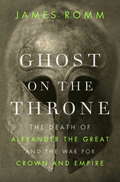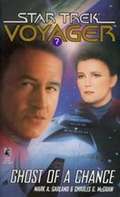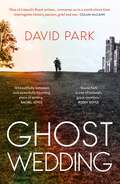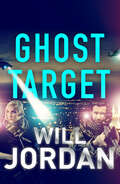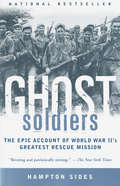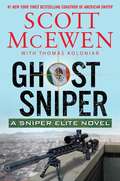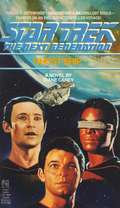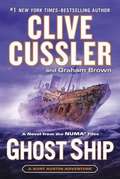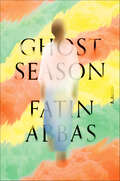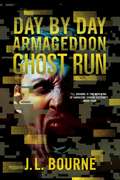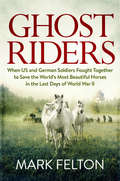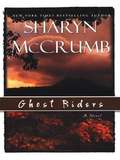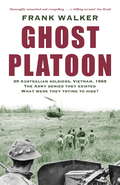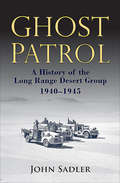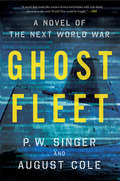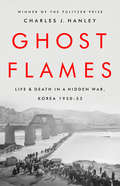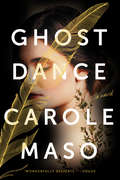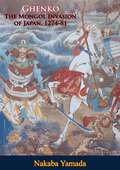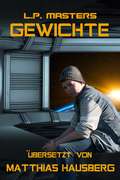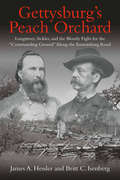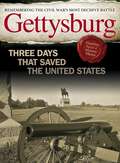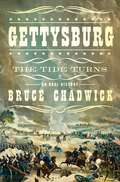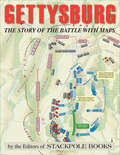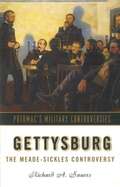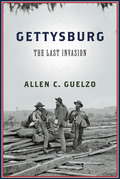- Table View
- List View
Ghost on the Throne: The Death of Alexander the Great and the Bloody Fight for His Empire
by James RommAlexander the Great, perhaps the most commanding leader in history, united his empire and his army by the titanic force of his will. His death at the age of thirty-two spelled the end of that unity.The story of Alexander's conquest of the Persian empire is known to many readers, but the dramatic and consequential saga of the empire's collapse remains virtually untold. It is a tale of loss that begins with the greatest loss of all, the death of the Macedonian king who had held the empire together. With his demise, it was as if the sun had disappeared from the solar system, as if planets and moons began to spin crazily in new directions, crashing into one another with unimaginable force.Alexander bequeathed his power, legend has it, "to the strongest," leaving behind a mentally damaged half brother and a posthumously born son as his only heirs. In a strange compromise, both figures--Philip III and Alexander IV--were elevated to the kingship, quickly becoming prizes, pawns, fought over by a half-dozen Macedonian generals. Each successor could confer legitimacy on whichever general controlled him.At the book's center is the monarch's most vigorous defender; Alexander's former Greek secretary, now transformed into a general himself. He was a man both fascinating and entertaining, a man full of tricks and connivances, like the enthroned ghost of Alexander that gives the book its title, and becomes the determining factor in the precarious fortunes of the royal family.James Romm, brilliant classicist and storyteller, tells the galvanizing saga of the men who followed Alexander and found themselves incapable of preserving his empire. The result was the undoing of a world, formerly united in a single empire, now ripped apart into a nightmare of warring nation-states struggling for domination, the template of our own times.From the Hardcover edition.
Ghost of a Chance (Star Trek: Voyager #7)
by Mark Garland Charles G. McGrawWhen an alien ship offers aid to both a damaged Voyager and a planet in peril, the crew members of the Voyager must decide whether or not to take their questionable offer.Badly damaged in a close encounter with a dwarf star, the Voyager discovers a planet being torn apart by tremendous volcanic stresses. The planet's primitive inhabitants will surely perish unless the Voyager intervenes—but the Prime Directive forbids them to act. And then the dilemma is increased by the arrival of another starship, a Televek vessel, whose crew offer to help both the Voyager and the people of the crumbling planet. But Janeway senses something amiss with their saviors, and she's haunted by ghostly visions warning her of a threat that make her loathe to accept anything from the Televek, even though they may be her only hope.
Ghost Wedding
by David ParkA POIGNANT STORY OF LOVE AND REGRET, FROM A MASTER OF CONTEMPORARY IRISH FICTION * 'David Park is one of Ireland's great novelists.' Roddy Doyle, author of The Commitments * For fans of Sebastian Faulks, Donal Ryan and Anne Tyler comes this beautiful novel following two troubled men, separated by nearly a century, bound by the ghosts of their past When George Allenby is put in charge of building a lake in the grounds of an imposing Irish manor house, he intends to do the job as swiftly as possible and return to Belfast. Allenby is still wrestling with his time as an officer during the First World War, burdened by the many things he could have done differently. Almost a century later, Alex and Ellie are preparing for their wedding, sparing no expense to hire a venue overlooking the very lake Allenby built all those years ago. Like Allenby before him, Alex is haunted by decisions he made in the past. Now, with the wedding drawing ever closer, he is at a crossroads. Telling the truth might free him from his guilt; it might also take away everything he cares about, including Ellie. In this masterful portrait of love and betrayal, David Park reveals the many ways the past seeps into the present: destructive, formidable, but also hopeful, in the moments of fragile beauty that remain.
Ghost Target (Ryan Drake)
by Will JordanIn this action-packed international thriller, a British Army veteran turned government operative must take down a rogue CIA agent. From Marseille to Islamabad at breakneck pace, it&’s kill or be killed . . . Ryan Drake—once a decorated field operative—is wanted for treason. On the run from the corrupt CIA Deputy Director Marcus Cain, he has settled in a remote French safehouse. His uneasy peace is soon shattered by a startling force. Meanwhile, with the war in Afghanistan faltering, the ambitious Cain claims to have a plan to destroy al-Qaeda&’s top commanders. And nobody will stand in his way. Backed into a corner, and suspecting Cain&’s motives, Drake turns to the deadly but unpredictable Anya—once Cain&’s protégé, now his most bitter enemy. With the fate of the War on Terror potentially hanging in the balance, Drake and a hastily assembled team travel to Pakistan to intercept Cain. As loyalties are tested and scores are settled, only one side will survive . . . An action-packed tale of desperation and betrayal, Ghost Target is ideal for fans of Tom Clancy and Vince Flynn. Praise for the Ryan Drake series: &“Entertaining.&” —The Daily Telegraph &“A heart-stopper for anyone who likes plenty of action and explosions.&” —Daily Mail
Ghost Soldiers: The Epic Account of World War II's Greatest Rescue Mission
by Hampton SidesNATIONAL BESTSELLER • &“The greatest World War II story never told&” (Esquire)—an enthralling account of the heroic mission to rescue the last survivors of the Bataan Death March—from the author of Blood and Thunder. On January 28, 1945, 121 hand-selected U.S. troops slipped behind enemy lines in the Philippines. Their mission: March thirty rugged miles to rescue 513 POWs languishing in a hellish camp, among them the last survivors of the infamous Bataan Death March. A recent prison massacre by Japanese soldiers elsewhere in the Philippines made the stakes impossibly high and left little time to plan the complex operation. In Ghost Soldiers Hampton Sides vividly re-creates this daring raid, offering a minute-by-minute narration that unfolds alongside intimate portraits of the prisoners and their lives in the camp. Sides shows how the POWs banded together to survive, defying the Japanese authorities even as they endured starvation, tropical diseases, and torture. Harrowing, poignant, and inspiring, Ghost Soldiers is the mesmerizing story of a remarkable mission. It is also a testament to the human spirit, an account of enormous bravery and self-sacrifice amid the most trying conditions.
Ghost Sniper: A Sniper Elite Novel (Sniper Elite #4)
by Thomas Koloniar Scott McEwenA top-secret band of elite warriors are forced to take a side in the Mexican drug wars in this “gripping, fast-paced adventure” (Dan Hampton, New York Times bestselling author of Viper Pilot) of the Sniper Elite series from the co-author of the #1 New York Times bestseller American Sniper.Bob Pope, the director of an American secret intelligence antiterrorism program, has lost contact with his most trusted operative, Navy Master Chief Gil Shannon, fearing him dead when a mission to take out a Swiss banker channeling funds to Muslim extremists goes awry. Now an American politician and her team have been assassinated in Mexico City by the Ghost Sniper—an American ex-military gunman-for-hire employed by Mexico’s most ruthless drug cartel—and Pope must turn instead to retired Navy SEAL Daniel Crosswhite and brand-new Sniper Elite hero, ex–Green Beret Chance Vaught, in order to track down the Ghost Sniper and expose the corrupt officials behind this murderous international plot!
Ghost Ship (Star Trek: The Next Generation #1)
by Diane CareyAn original novel based on the acclaimed Star Trek TV series! In 1995, a Russian aircraft carrier is destroyed by a mysterious creature that just as mysteriously disappears thereafter. Three hundred years later, Counsellor Deanna Troi awakens in her quarters from a nightmare in which she senses the voices of the crew of that Russian ship, whose life-essences were somehow absorbed by the creature that destroyed them. And the nightmare heralds a danger to the Enterprise itself, for if Picard can't discover a way to communicate with the creature, it could absorb his crew just as it did the Russians.
Ghost Ship (NUMA Files #12)
by Clive Cussler Graham BrownThe dazzling new novel in the #1 New York Times-bestselling series from Clive Cussler, the grand master of adventure.<P> When Kurt Austin is injured attempting to rescue the passengers and crew from a sinking yacht, he wakes with fragmented and conflicted memories. Did he see an old friend and her children drown, or was the yacht abandoned when he came aboard? For reasons he cannot explain, Kurt doesn't trust either version of his recollection.<P> Determined to know the truth, he begins to search for answers, and soon finds himself descending into a shadowy world of state-sponsored cybercrime, and uncovering a pattern of vanishing scientists, suspicious accidents, and a web of human trafficking. With the help of Joe Zavala, he takes on the sinister organization at the heart of this web, facing off with them in locations ranging from Monaco to North Korea to the rugged coasts of Madagascar. But where he will ultimately end up¾even he could not begin to guess.
Ghost Season: A Novel
by Fatin AbbasA dynamic, beautifully orchestrated debut novel connecting five characters caught in the crosshairs of conflict on the Sudanese border.A mysterious burnt corpse appears one morning in Saraaya, a remote border town between northern and southern Sudan. For five strangers on an NGO compound, the discovery foreshadows trouble to come. South Sudanese translator William connects the corpse to the sudden disappearance of cook Layla, a northern nomad with whom he’s fallen in love. Meanwhile, Sudanese American filmmaker Dena struggles to connect to her unfamiliar homeland, and white midwestern aid worker Alex finds his plans thwarted by a changing climate and looming civil war. Dancing between the adults is Mustafa, a clever, endearing twelve-year-old, whose schemes to rise out of poverty set off cataclysmic events on the compound.Amid the paradoxes of identity, art, humanitarian aid, and a territory riven by conflict, William, Layla, Dena, Alex, and Mustafa must forge bonds stronger than blood or identity. Weaving a sweeping history of the breakup of Sudan into the lives of these captivating characters, Fatin Abbas explores the porous and perilous nature of borders—whether they be national, ethnic, or religious—and the profound consequences for those who cross them. Ghost Season is a gripping, vivid debut that announces Abbas as a powerful new voice in fiction.
Ghost Run (Day by Day Armageddon #4)
by J. L. BourneThe acclaimed and eagerly anticipated fourth thriller in the zombie apocalypse series from the author of Day by Day Armageddon and Day by Day Armageddon: Beyond Exile, for fans of the smash hit show The Walking Dead.In a desperate bid to survive as hordes of bloodthirsty undead now dominate the ravaged U.S. population, a Navy commander discovers an incredible secret about the pandemic in this fourth novel in the acclaimed Day by Day Armageddon series. Task Force Phoenix may be humanity's final hope, and the narrator's agonizing decisions could mean living one more day--or surrendering to the eternal hell that exists between life and death. Ghost Run is a suspenseful, gripping, and intelligent thriller that will terrify die-hard horror fans and reinforce J.L. Bourne's reputation as "the new king of hardcore zombie action" (Brad Thor, author of Act of War).
Ghost Riders: When US and German Soldiers Fought Together to Save the World's Most Beautiful Horses in the Last Days of World War II
by Mark FeltonIt is April 1945 and the world's most prized horses are about to be slaughtered...As the Red Army closes in on the Third Reich, a German colonel sends an American intelligence officer an unusual report about a POW camp soon to be overrun by the Soviets. Locked up, the report says, are over a thousand horses, including the entire herd of white Lipizzaner's from Vienna's Spanish Riding School, as well as Europe's finest Arabian stallions--stolen to create an equine "master race." The horses are worth millions and, if the starving Red Army reaches the stables first, they will kill the horses for rations. The Americans, under the command of General George Patton, whose love of horses was legendary, decide to help the Germans save the majestic creatures. So begins "Operation Cowboy," as GIs join forces with surrendered German soldiers and liberated prisoners of war to save the world's finest horses from fanatical SS soldiers and the ruthless Red Army in an extraordinary battle during the last few days of the war in Europe. This is an epic untold story from the waning days of World War II.Drawing from newly unearthed archival material, family archives held by descendants of the participants, and interviews with many of the participants published throughout the years, Ghost Riders is the definitive account of this truly unprecedented and moving story of kindness and compassion at the close of humanity's darkest hour.
Ghost Riders
by Sharyn MccrumbThis novel tells the story of the Civil War in the Appalachians, based on actual events, where neighbors became enemies, and the half-life of violence keeps soldiers' ghosts abroad in the modern wilderness.
Ghost Platoon
by Frank Walker'thoroughly researched and compelling . . . a chilling account' - The Sun HeraldAn eye-opening account of Australian combat history, untold . . . until now.In 1969 a ragtag unit of 39 men were thrown together at Nui Dat, Vietnam. It was so slapdash a group it didn't even have an officer or sergeant in charge. A rugged ex-Royal Marine stepped forward to take the lead. Jim Riddle was only an acting corporal but he knew enough of war to keep these young diggers alive.When the platoon was involved in a high-risk ambush Riddle proved his leadership skills, bringing his men through unscathed and leaving the battlefield littered with enemy bodies.Despite their success, immediately afterwards the platoon was disbanded. According to the army they'd never existed ? theirs was a ghost platoon.Frank Walker details what happened at that ambush and why the army buried their existence, and the secrets that went with it. His findings are a shocking indictment of the long-term effects of war. The men of the platoon ? who'd fought so hard for their country ? had to fight again to reveal the truth. But the price they all paid was far too high.Ghost Platoon is a gripping story of the soldiers who should never be forgotten . . . or denied.
Ghost Patrol: A History of the Long Range Desert Group, 1940-1945
by John SadlerFrom the author of D-Day: “an amazing tale of how the world’s very first special force was created specifically for North Africa during WWII” (Books Monthly).The origins of most of the West’s Special Forces can be traced back to the Long Range Desert Group, which operated across the limitless expanses of the Libyan Desert, an area the size of India, during the whole of the Desert War from 1940 to 1943. After the defeat of the Axis in North Africa, they adapted to serve in the Mediterranean, the Greek islands, Albania, Yugoslavia, and Greece. In the process, they became the stuff of legend.The brainchild of Ralph Bagnold, a prewar desert explorer featured in fictional terms in The English Patient, the LRDG used specially adapted vehicles and recruited only men of the right temperament and high levels of fitness and endurance. Their work was often dangerous, always taxing, exhausting, and uncomfortable. They were a new breed of soldier, and the Axis never managed to field a similar unit.Once the desert war was won, they transferred their skills to the Mediterranean sector, retraining as mountain guerrillas, serving in the ill-fated Dodecanese campaign, then in strife-torn Albania, Yugoslavia, and Greece, fighting alongside the mercurial partisans. In addition, the LRDG worked alongside the fledgling SAS and established, beyond all doubt, the value of highly trained Special Forces, a legacy which resonates today.“Genuinely gripping, a tale of eccentrics and their high adventures during very dangerous times.” —Classic Military Vehicle
Ghost Fleet: A Novel of the Next World War
by P. W. Singer August Cole"A novel that reads like science fiction but bristles with rich detail about how the next World War could be fought." --Vice"A modern-day successor to tomes such as The Hunt for Red October from the late Tom Clancy." --USA Today What Will World War III Look Like? Ghost Fleet is a page-turning imagining of a war set in the not-too-distant future. Navy captains battle through a modern-day Pearl Harbor; fighter pilots duel with stealthy drones; teenage hackers fight in digital playgrounds; Silicon Valley billionaires mobilize for cyber-war; and a serial killer carries out her own vendetta. Ultimately, victory will depend on who can best blend the lessons of the past with the weapons of the future. But what makes the story even more notable is that every trend and technology in book--no matter how sci-fi it may seem--is real. The debut novel by two leading experts on the cutting edge of national security, Ghost Fleet has drawn praise as a new kind of technothriller while also becoming the new "must-read" for military leaders around the world. "A wild book, a real page-turner." --The Economist "Ghost Fleet is a thrilling trip through a terrifyingly plausible tomorrow. This is not just an excellent book, but an excellent book by those who know what they are talking about. Prepare to lose some sleep."--D. B. Weiss, writer of HBO's Game of Thrones "It's exciting, but it's terrifying at the same time."--General Robert Neller, commandant of the U.S. Marine Corps
Ghost Flames: Life and Death in a Hidden War, Korea 1950-1953
by Charles J. HanleyA powerful, character-driven narrative of the Korean War from the Pulitzer Prize-winning writer who helped uncover some of its longest-held and darkest secretsThe war that broke out in Korea on a Sunday morning 70 years ago has come to be recognized as a critical turning point in modern history, as the first great clash of arms of the Cold War, the last conflict between superpowers, and the root of a nuclear crisis that grips the world to this day.In this vivid, emotionally compelling and highly original account, Charles J. Hanley tells the story of the Korean War through the eyes of 20 individuals who lived through it--from a North Korean refugee girl to an American nun, a Chinese general to a black American prisoner of war, a British journalist to a US Marine hero.This is an intimate, deeper kind of history, whose meticulous research and rich detail, drawing on recently unearthed materials and eyewitness accounts, brings the true face of the Korean War, the vastness of its human tragedy, into a sharper focus than ever before. The "Forgotten War" becomes unforgettable.In decades as an international journalist, Hanley reported from some 100 countries and covered more than a half-dozen conflicts, from Vietnam to Afghanistan and Iraq.
Ghost Dance: A Novel
by Carole Maso"Although author Carole Maso follows the contours of fiction, style is everything in Ghost Dance, a strangely lovely and perplexing book . . . she has a fine ear and her literary gift is impressive." —San Francisco ChronicleOriginally published in 1986, Ghost Dance is the first in a line of relentlessly experimental and highly esteemed works by Carole Maso.Vanessa Turin's family has been broken up by an event so devastating she cannot bear to face it straight on. Her mother, the brilliant and beautiful poet Christine Wing, seems simply to have disappeared, and her gentle, silent father also vanishes. In Ghost Dance, the reader experiences firsthand the dimensions of Vanessa's longing, the capabilities of her imagination, the persistence of her memory, and the ferocity of her love as she struggles to retrieve her family, to reclaim her country, and to come to terms with overwhelming sorrow.
Ghenko: The Mongol Invasion of Japan, 1274-81
by Nakaba Yamada“A ferocious conflict between Mongol and Samurai.The Japanese word 'Ghenko' is the term employed for the Mongol invasion of Japan. The event was an immensely significant one for the Japanese and it remained so for centuries because, in part, the defeat of the invaders was attributed to divine intervention. There can be little doubt that Japan's salvation had much to do with the fact that they are an island race and in that they have much in common with other islanders, Great Britain among them, who on more than one occasion might claim the sea as their principal and most powerful ally. Indeed, the author of this book draws parallels with Britain and the Spanish Armada. The Mongols had rapidly risen to power during the 13th century and had created an unstoppable empire that spread over huge areas of land from the Yellow Sea of Asia to the Danube in Europe. Although massively stronger than the Japanese, the Mongols attacked the Japanese islands, attempting domination by invasion and yet were repulsed with finality. To modern students of military history the contents of this book has a compelling allure, since there can be no doubt that in the Mongol warrior and the Japanese Samurai there resided a martial spirit and expertise which, perhaps inevitably, could not both exist in the same sphere, but which in collision could not fail to instigate conflict of the most singular kind. This account of the clash between the ultimate warriors of their day analyses this time of warfare in superb detail. An essential addition to the library of anyone interested in the warfare of the East.”-Print ed.
Gewichte
by L. P. MastersDas Weltraumkriegsschiff, auf dem der vierzehnjährige Kaden Lowery dient, wird von einem unsichtbaren Feind angegriffen: der Schwerkraft. Kaden muss sich mit seiner Vergangenheit und mit dem, was er ist, auseinandersetzen, um sich und die Besatzung zu retten.
Gettysburg’s Peach Orchard: Longstreet, Sickles, and the Bloody Fight for the “Commanding Ground” Along the Emmitsburg Road
by James A. Hessler Britt C. IsenbergWinner, 2019, The Bachelder-Coddington Literary Award, Given by the Robert E. Lee Civil War Round Table of Central New Jersey More books have been written about the battle of Gettysburg than any other engagement of the Civil War. The historiography of the battle’s second day is usually dominated by the Union’s successful defense of Little Round Top, but the day’s most influential action occurred nearly one mile west along the Emmitsburg Road in farmer Joseph Sherfy’s peach orchard. Despite its overriding importance, no full-length study of this pivotal action has been written until now. James Hessler’s and Britt Isenberg’s Gettysburg’s Peach Orchard: Longstreet, Sickles, and the Bloody Fight for the “Commanding Ground” Along the Emmitsburg Road corrects that oversight. On July 2, 1863, Confederate Gen. Robert E. Lee ordered skeptical subordinate Lt. Gen. James Longstreet to launch a massive assault against the Union left flank. The offensive was intended to seize the Peach Orchard and surrounding ground along the Emmitsburg Road for use as an artillery position to support the ongoing attack. However, Union Maj. Gen. Daniel Sickles, a scheming former congressman from New York, misinterpreted his orders and occupied the orchard first. What followed was some of Gettysburg’s bloodiest and most controversial fighting. General Sickles’s questionable advance forced Longstreet’s artillery and infantry to fight for every inch of ground to Cemetery Ridge. The Confederate attack crushed the Peach Orchard salient and other parts of the Union line, threatening the left flank of Maj. Gen. George Meade’s army. The command decisions made in and around the Sherfy property influenced actions on every part of the battlefield. The occupation of the high ground at the Peach Orchard helped General Lee rationalize ordering the tragic July 3 assault known as “Pickett’s Charge.” This richly detailed study is based upon scores of primary accounts and a deep understanding of the terrain. Hessler and Isenberg, both Gettysburg Licensed Battlefield Guides, combine the military aspects of the fighting with human interest stories in a balanced treatment of the bloody attack and defense of Gettysburg’s Peach Orchard.
Gettysburg: Three Days That Saved the United States
by Ben NussbaumPacked with facts, stories, and illustrations, a guide to the historic Pennsylvania battle that marked a turning point in the American Civil War. From the first shots fired at 7:30 a.m. on July 1, 1863 in a field west of Gettysburg to Robert E. Lee&’s losing gamble known as Pickett&’s Charge on July 3, just fifty-five hours later, Gettysburg is a snapshot of three of the most important days in US history. Editor Ben Nussbaum has compiled a fascinating retelling of political, military, and social conditions that thrust the sleepy town of Gettysburg forever into the pages of history books. In addition to informative timelines and fact sheets of the battle of Gettysburg and the Civil War, this handsomely illustrated volume also captures the human stories—of Father Corby and the Irish Brigade; Amos Humiston, the unidentified father who died in battle clutching a photograph of his three children; the eleven-year-old sergeant, John L. Clem, who killed a Confederate soldier; John Burns, the only civilian to fight in the battle; and Jubal Early, an unlikely general who &“scared Abraham Lincoln like hell.&” Also included is the poignant story and photographs of a reunion fifty years later of fifty thousand Union and Confederate veterans, among them a man believed to be 112 years old, and a chapter focusing on a dozen significant monuments among Gettysburg&’s numerous historic landmarks. In addition, a resource section offers readers and visitors ways to learn more about the Battle of Gettysburg, including books, websites, and games.
Gettysburg: The Tide Turns: An Oral History
by Bruce ChadwickThe definitive oral history of the battle that turned the tide of the Civil War that combines vivid first-hand accounts with rich historical narrative.In late June of 1863, one month after his victory over Union forces at Chancellorsville, Virginia, General Robert E. Lee, head of the Army of Northern Virginia, invaded the North. He would cross the Potomac River and head towards Harrisburg, Pennsylvania, with the goal of seizing the trains which would then take his army into Philadelphia and perhaps even New York City. He hoped that these victories would force U.S. President Abraham Lincoln to surrender. As he pushed north, Lee was operating without his cavalry leader, J.E.B. Stuart, whom he had allowed to go on a useless scouting mission. At the same time, the Union army, now led by little known commander George Meade was tracking Lee and his men. Both sides clashed at Gettysburg, a tiny Pennsylvania farm village on July 1 in what would be a three-day battle that would change the course of the war. The battle would reveal the mettle of the unheralded Meade and would also call into question General Lee&’s reputation as a legendary commander when he unleashed the ill planned and ill prepared Pickett&’s Charge. The battle proved costly to both sides. Some 50,000 men were killed across the battlefield and the defeated Lee&’s army would never again invade the North. After so much bloodshed, President Lincoln's history-making and eloquent Gettysburg Address came to embody the essence of the war. The address, not even three minutes long, is considered the finest speech ever delivered buy an American President and has been memorized by generations ever since. Using letters, diaries, journals, newspaper articles, and other written sources, Bruce Chadwick has crafted another masterful oral history. Skillfully combining traditional historic narrative with the in-the-moment ethos of an oral history, Gettysburg: The Tide Turns brings this iconic battle to fresh and vivid life.
Gettysburg: The Story of the Battle with Maps
by Editors of Stackpole BooksA unique visual account: &“The hour-by-hour maps of the maneuvering and fighting provide the clearest cartographic picture of the battle in existence.&” —James M. McPherson, Pulitzer Prize-winning author of Battle Cry of Freedom In this extraordinary book, seventy crystal-clear color maps and insightful text tell the hour-by-hour story of the three-day Battle of Gettysburg. Each map shows the same three-and-a-half-by-four-and-a-half-mile view of the battlefield, allowing the reader to visualize the battle as it developed over the entire area, including key engagements, troop movements and positions, and locations of commanders. It sheds new light on important events such as the first clash west of town on July 1, the fighting for Cemetery Hill, the defense of Little Round Top, Pickett&’s Charge, and more. &“The accompanying text brings the battle alive and nicely compliments the maps.&” —D. Scott Hartwig, author of To Antietam Creek &“The movements are depicted clearly, and in full color, so that even a complete newcomer to the battle can follow the action easily.&”—Craig L. Symonds, author of The American Heritage History of the Battle of Gettysburg
Gettysburg: The Meade-Sickles Controversy
by Richard A. SauersThe book examines in depth the dissension among Federal generals that threatened the union's army ability to defeat the Confederacy.
Gettysburg: The Last Invasion (Vintage Civil War Library)
by Allen C. GuelzoWinner of the Guggenheim-Lehrman Prize in Military HistoryAn Economist Best Book of the YearA Kirkus Reviews Best Nonfiction Book of the YearThe Battle of Gettysburg has been written about at length and thoroughly dissected in terms of strategic importance, but never before has a book taken readers so close to the experience of the individual soldier. Two-time Lincoln Prize winner Allen C. Guelzo shows us the face, the sights and the sounds of nineteenth-century combat: the stone walls and gunpowder clouds of Pickett&’s Charge; the reason that the Army of Northern Virginia could be smelled before it could be seen; the march of thousands of men from the banks of the Rappahannock in Virginia to the Pennsylvania hills. What emerges is a previously untold story of army life in the Civil War: from the personal politics roiling the Union and Confederate officer ranks, to the peculiar character of artillery units. Through such scrutiny, one of history&’s epic battles is given extraordinarily vivid new life.
